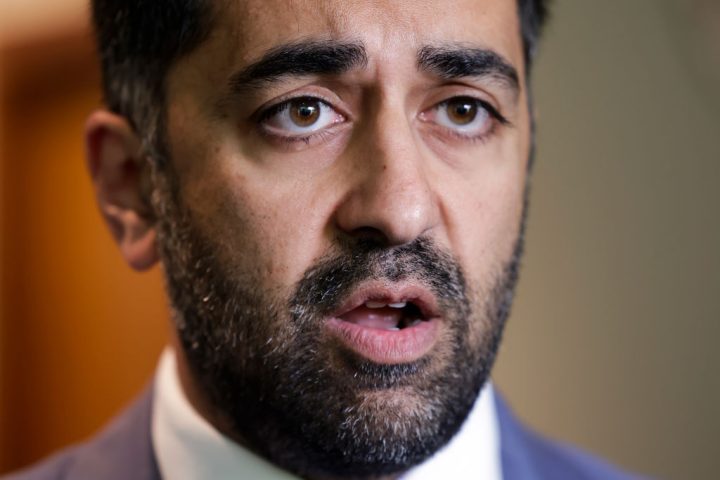Not so very long ago, Scotland’s nationalist minority was mustering behind a catastrophic plan to treat the next general election as a ‘de facto’ referendum. Having over-promised for years about her ability to deliver a second vote on the constitution, former SNP leader Nicola Sturgeon declared that a majority of votes for pro-independence candidates would give her the green light to open secession talks with whoever was prime minister.
‘Hurrah!’ cheered nationalists, ‘This is a brilliant idea.’ Then Sturgeon resigned amid a police investigation into her party and was succeeded by Humza Yousaf, who declared he was not in favour of Sturgeon’s ‘de facto’ referendum idea.
No matter the concessions Westminster makes, the nationalists cry betrayal
‘Hurrah!’ cheered nationalists, ‘That was a terrible idea.’ Yousaf’s First Ministership didn’t get off to a flying start and, three months on, he remains on the ground, stumbling from crisis to crisis, struggling to get a firm grip on his party.
But Yousaf did get one thing right, early on. He levelled with his supporters about how difficult it would be to win the right to hold a second referendum. What’s more, after years of Sturgeon insisting that independence had comfortably become the preference of the majority, Yousaf declared that this was not so. In fact, the nationalists had not yet convinced more than half of Scots that leaving the UK is a good idea and so the SNP’s focus should be on building support rather than demanding a referendum they’d likely lose.
But Nats are gonna Nat so, despite the new First Minister’s cautious words on taking office, the weeks since have seen him and sundry colleagues insist that a referendum is essential now.
Of course, this is typical bluster. It feeds the core support and energises the SNP’s parliamentarians, many of whom have neither the capacity nor the inclination to think about anything beyond the constitutional battle.
The nationalists’ latest wheeze is to float the idea of a multi-option referendum which, alongside options to leave or remain within the UK, would offer the prospect of new powers for the Scottish Parliament. In an interview with the Daily Record, Independence Minister – yes, Scottish taxpayers pay for a minister whose sole responsibility is advancing his party’s constitutional campaign – Jamie Hepburn said his party must consider this multi-option referendum.
The road to achieving this is paved with ifs and buts. But the gist of Hepburn’s argument is that, should Keir Starmer lead Labour to victory but fall short of an outright majority at the next election, the SNP would offer to support him in confidence votes in return for the right to hold a referendum.
There are problems with this scenario. The SNP’s position falls apart the moment Labour says ‘no’. What would the Scottish nationalists do in that event? Would they really open the door to the return of a Tory government? No, they would not. ‘Give us a referendum or we’ll bring you down’ is a bluff Starmer could comfortably call every day of the week and twice on Sundays.
Back during the run-up to the 2014 referendum, then SNP leader Alex Salmond was quite taken with the idea of a multi-option paper. Fearful of losing on a straight Yes/No basis, he reckoned a so-called ‘Devo-Max’ option would appeal to the moderate majority.
But the prime minister of the day wasn’t having it. David Cameron was adamant that the question should be a binary one. This would settle the matter once and for all…
With Scottish politics locked in a Mexican stand-off over the constitution, a Devo-Max offer might appear an appealing solution. However, there is an SNP shaped barrier to it happening. Since coming to power in 2007, the SNP has won many new powers for the Scottish Parliament, but nothing is ever enough. No matter the concessions Westminster makes, the nationalists cry betrayal.
Many Scots may favour a more powerful Holyrood but, through their attitude to past UK government concessions, the SNP have made that prospect less likely under their rule. Why would any prime minister give anything to the SNP when all they’d get in return is accusations of cheating Scotland?







Comments